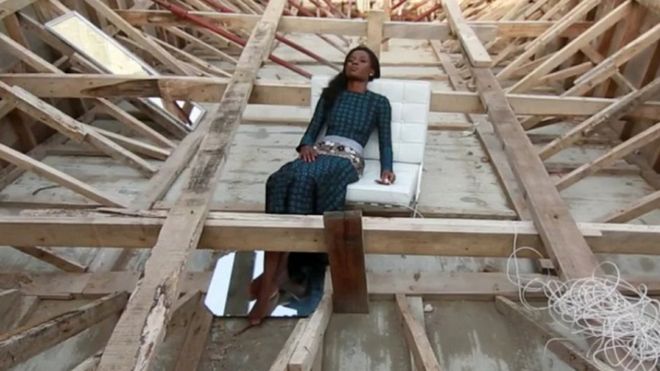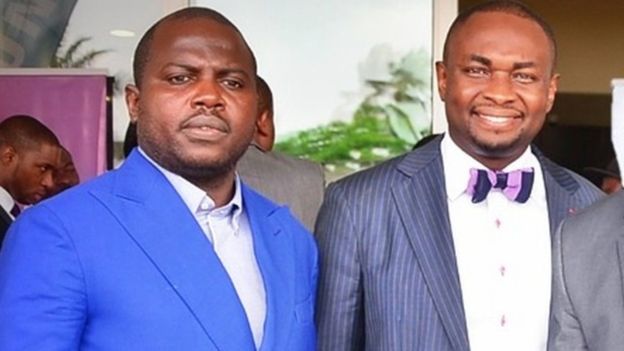
As Africa’s most-populous country turns 56, many Nigerians may not be in the mood for celebration – preoccupied as they are with the ongoing recession.
For Nigerian businesses, 2016 has indeed been a challenging year. The oil-dependent nation is presently in an economic downturn, largely because of the drop in oil prices.
As a consequence, the prices of goods and services have gone up and for many businesses profits are thin.
But some fresh, young entrepreneurs are bucking the trend.
“Whatever direction the economy goes, there are always opportunities,” says Obinna Onunkwo, one of the Nigerians who is changing the face of the property scene.

Maryland Mall opened in Lagos’ Ikeja suburb in June this year
He and his business partner Laide Agboola – who are both under 40 – have just completed the development of a $25m (£19.2m), 7,700-sq-metre retail centre in Lagos.
Nigeria’s retail sector has seen significant growth over the past five years and savvy investors like Mr Onunkwo tapped in early. They managed to convince investors that the Maryland Mall in Ikeja was a bankable project.

After five months of pitching to investors last year, they were able to raise funds.
Mr Onunkwo believes the key to their success was that they ensured any loans they took were in the local currency, the naira, and not dollar loans.
A good decision as the naira has weakened significantly over the past year.
‘People need to rent even in a recession’
Sulaiman Balogun, co-founder of ToLet.com.ng – a Nigerian online property search portal, will remember 2016 as the year the cash came in.
He and his business partners – Fikayo Ogundipe, Dapo Eludire and Seyi Ayeni – have succeeded in raising $1.2m.

This is quite a feat as banks and financial institutions in Nigeria are not keen to lend to new businesses because of a lack of credit records and insufficient collateral.
Enterprising technology-driven businesses like ToLet have to prove themselves, sometimes with very little capital, in the hope that big time venture capital firms take notice.
After meeting at university, Mr Balogun and his partners started their business in June 2012, when they were in their twenties and at a time when online property search websites were not popular in Nigeria.
The partners raised $400 from their personal savings and with family support embarked on their business journey.
A year after launching their property platform they managed to raise $230,000 in seed capital from online business builder, Spark.ng, and this made a significant contribution to the growth of their business.
“They prove that it is possible to diversify away from oil – and show the enterprising spirit of the country as it celebrates its 56th year”
However, their big break came last month, when they caught the eye of Frontier Digital Ventures, a company passionate about online classifieds businesses, and they successfully secured additional funds.
Two key things have been the secret to their success.
“We anticipated the recession and kept costs low,” says Mr Balogun.
“And people still need to look for homes to rent in a recession.”
‘Go beyond Africa’
For Papa Omotayo, a 40-year-old Lagos-based architect, looking to markets outside Nigeria can help entrepreneurs weather an economic slump.
“Make sure your reach goes beyond Africa,” says Mr Omotayo, the founder of AWCA, a multi-award winning ideas development agency.
He has been driven to change the way the African continent is portrayed globally, through art and creativity.

Teaming up with 29-year-old Maki Osakwe, creative director of Maki Oh, a fashion brand worn by the likes of Michelle Obama, Lupita Nyong’o and Solange Knowles, the two produced a short fashion film entitled Omi.
It just bagged the Best New Director award this week at Milan’s fashion film festival.
Mr Omotayo says diversity is the secret to his success – ensuring that Nigeria’s arts and culture scene reaches beyond Africa.
And although he has seen a shift in the spending power of Nigerians this year, his creative business has not slowed down as much as expected, and he is confident that more opportunities will open up for him.
These young entrepreneurs are making headlines – in spite of Nigeria’s recession.
They prove that it is possible to diversify away from oil – and show the enterprising spirit of the country as it celebrates its 56th year.
This article was published with permission from Didi.
Didi Akinyelure, is the current BBC World News Komla Dumor Award Winner. Didi is currently publishing a series of articles for the BBC.











